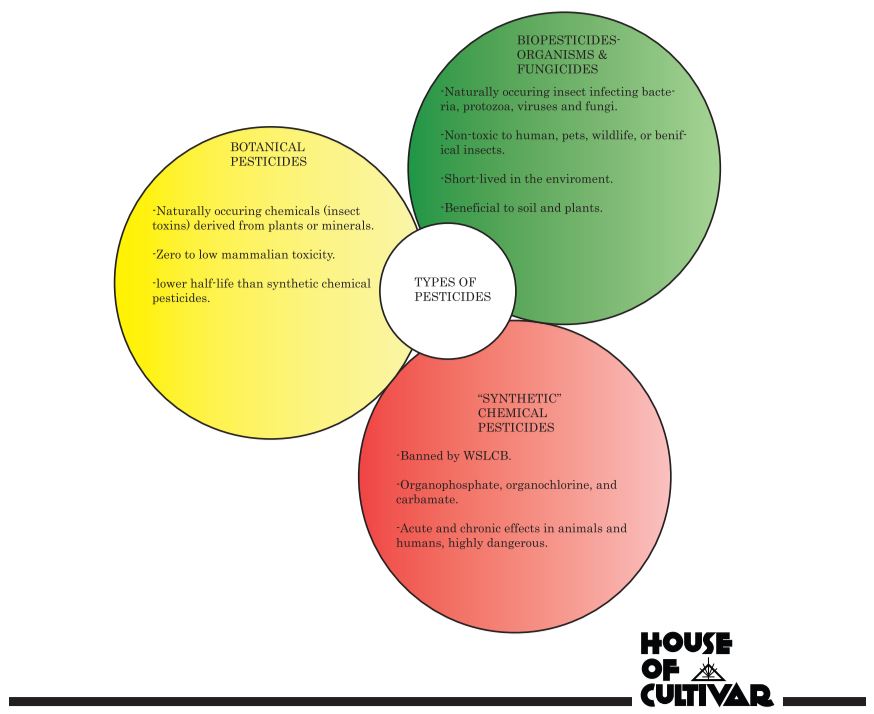Pesticide Statement
IPM – Integrated Pest Management
House of Cultivar utilizes a unique and highly advanced INTEGRATED PEST MANAGEMENT (IPM) PROGRAM. Contrary to public perception “pesticide” is not a simple definition in the world of agriculture. Pesticides are any substance, or mixture of substances, used to prevent, destroy, repel, or mitigate pests. To simplify the extremely complex nuances of all different types of pesticides, our program proposes that, in a general sense, pesticides fall into three different categories: Natural Non-Synthetic Biopesticides, Botanical Pesticides, and Synthetic Chemical (Toxic) Pesticides.
NATURAL BIOPESTICIDES – ORGANISMS and FUNGICIDES
Better and safer than synthetic non-organic chemicals, biological pest control is based on utilizing highly specific, naturally-occurring insect-infecting bacteria, protozoa, viruses, and fungi. These products are very effective against their target insects but are non-toxic to humans, pets, wildlife, and beneficial insects. Biopesticides are also short-lived in the environment and are less likely to result in insect resistance than synthetic chemicals. In addition to fighting disease and pests, these organisms benefit your soil and plants by decomposing organic matter releasing nutrients for absorption and helping improve the tilth of the soil. We use a few different Biopesticides that include:
• Root Shield (Trichoderma harzianum): Soil inoculant that uses the highly-effective hybrid fungus
• Venerate (Burkholderia spp): A biological insecticide
• Regalia (Reynoutria sachalinensis): Organic biofungicide chrysanthemum extract used to boost plant immune system
• Grandevo: Uses the bacterium Chromobacterium subtsugae to provide long-lasting, broad spectrum control of sucking and chewing insects
All of the above products are OMRI-listed insecticides, formulated and registered for use in certified organic production facilities. The OMRI seal ensures compliance with organic standards set by the National Organic Program (NOP), a regulatory body within the USDA.
BOTANICAL PESTICIDES
The second line of defense in any comprehensive “IPM” program is the incorporation of botanical pesticides. Botanical Pesticides are naturally-occurring chemicals (insect toxins) extracted or derived from plants or minerals. The most common and approved Botanical Pesticides for use in the cannabis industry include essential oils from citrus (limonene and linalool), cedar, lavender, and plant extracts such as pyrethrin and neem cake.
While these plants extracts are naturally occurring, often OMRI certified, (approved for use by organic gardeners), and range from zero to low mammalian toxicity, they should still be used with discretion. In general, they act quickly, degrade rapidly, (leaving little to no residuals on the plants), and have, with few exceptions, low mammalian toxicity. Given that products with neem or pyrethrin can leave residuals if applied to flowering plants in the last several weeks of the bloom cycle, resulting in a low level of human toxicity, we do not use any of these products in our IPM program.
We limit our botanical pesticide use to organic OMRI certified citric acid (citrus essential oils) base product called Super Safe®. To ensure the highest level of consumer safety the manufacturer guarantees every batch of Super Safe® formulated will have a batch number and every batch will be tested for 59 adverse chemicals along with yeast, mold, and bacteria in an effort.
“SYNTHETHIC” CHEMICAL PESTICIDES
The USDA National Organic Program regulations defines synthetic as: “A substance that is formulated or manufactured by a chemical process or by a process that chemically changes a substance extracted from naturally occurring plant, animal, or mineral sources, except that such term shall not apply to substances created by naturally occurring biological processes.”
To put plainly, these are the four-letter pesticides. Synthetic chemical pesticides are typically broken into three main groups: organochlorine, organophosphate, and carbamate. Exposure to these types of pesticides can cause acute (short term) or chronic (long term) effects on animals and humans, especially in the reproductive, endocrine, and central nervous systems. These pesticides are highly dangerous and have no place in cannabis cultivation, ethically or compliantly. Cultivar Farms does not condone or respect the use of such products.
